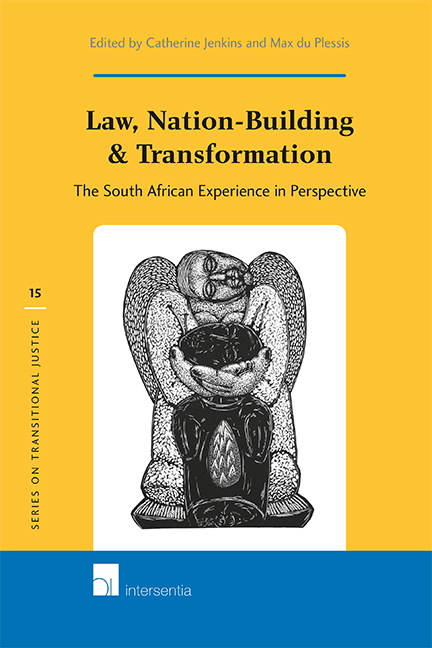Book contents
- Frontmatter
- Editors’ Foreword
- Contents
- Chapter 1 Transitional Justice: Lessons from South Africa?
- Chapter 2 Reflections on Post-Apartheid Nation-Building: Identity, Participation, Community
- Chapter 3 The Truth and Reconciliation Commission Process: A Retrospective
- Chapter 4 Rights at Work: The Transition to Constitutional Democracy and Women in South Africa
- Chapter 5 Crime, Policing and Nation-Building
- Chapter 6 Public Schools for Afrikaners in South Africa
- Chapter 7 Behind the Mask of the Rainbow Nation: The Limits of Law in Post-Apartheid South Africa
- Chapter 8 The Transformation of the Judiciary
- Chapter 9 Assessing the Social Transformation Performance of the South African Constitutional Court: From Totalitarianism to the Rule of Law
- Chapter 10 The Transformation of Land Law
- Chapter 11 The South African Presidency in Comparative African Context
- Chapter 12 Aspects of the Treatment of Freedom of Expression in South Africa’s Democratic Transition
- Chapter 13 Constitutionalism in Commonwealth Africa: Comparative Perspectives
Editors’ Foreword
Published online by Cambridge University Press: 16 December 2020
- Frontmatter
- Editors’ Foreword
- Contents
- Chapter 1 Transitional Justice: Lessons from South Africa?
- Chapter 2 Reflections on Post-Apartheid Nation-Building: Identity, Participation, Community
- Chapter 3 The Truth and Reconciliation Commission Process: A Retrospective
- Chapter 4 Rights at Work: The Transition to Constitutional Democracy and Women in South Africa
- Chapter 5 Crime, Policing and Nation-Building
- Chapter 6 Public Schools for Afrikaners in South Africa
- Chapter 7 Behind the Mask of the Rainbow Nation: The Limits of Law in Post-Apartheid South Africa
- Chapter 8 The Transformation of the Judiciary
- Chapter 9 Assessing the Social Transformation Performance of the South African Constitutional Court: From Totalitarianism to the Rule of Law
- Chapter 10 The Transformation of Land Law
- Chapter 11 The South African Presidency in Comparative African Context
- Chapter 12 Aspects of the Treatment of Freedom of Expression in South Africa’s Democratic Transition
- Chapter 13 Constitutionalism in Commonwealth Africa: Comparative Perspectives
Summary
In this collection of essays, we bring together the reflections of some of South Africa's leading scholars on a number of aspects of South Africa's transition to democracy and the country's efforts at ‘nation-building’ since 1994, and set them in comparative and historical perspective with the addition of some international contributions.
Last week, South Africans mourned the passing of former President Nelson Mandela and celebrated his long and remarkable lifetime of struggle, commitment and service. In April 2014, South Africa will mark the elapse of twenty years since its first democratic elections. These significant events in the life of the country and its people are generating both internal and international deliberation on the current state of the nation.
The range of topics included in this volume is deliberately broader than one might conventionally expect to find in a book published in a series on transitional justice. We take the view (as Catherine Jenkins argues in Chapter 1) that the narrower definitions of transitional justice to which we have become accustomed, which focus heavily on accountability for past crimes, are accidents of history, based largely on the origins of the battle against impunity in the relatively wealthy and developed countries of Latin America. In our view, these definitions of transitional justice are inadequate and inappropriate for most African states, in which deep and widespread poverty is a major concern and democratic institutions and processes may never have been firmly rooted. For these countries, the concept of justice in transition must, we suggest, be wider, reflecting the demand for both bread and freedom and the need for extensive reform and institution-building. In the case of South Africa, the constant references in political discourse since 1994 to the need for ‘nation-building’ and ‘transformation’ reflect both the enormity of the legacy of apartheid and the daunting scale of the socio-economic undertaking facing post-apartheid South Africa. In the light of South Africa's commitment to a new constitutional dispensation and to legal regulation, we have chosen to give a particular focus to the ways in which law and lawyers have played a role in social and political change since the early 1990s, though the contributions in the volume are not exclusively from scholars with a disciplinary background in law.
- Type
- Chapter
- Information
- Law, Nation-Building and TransformationThe South African Experience in Perspective, pp. v - xPublisher: IntersentiaPrint publication year: 2014

